- Implementation of the midterm plan and promotion of reconstruction efforts in Iwate
- Major Project Achievements for Academic Year 2012
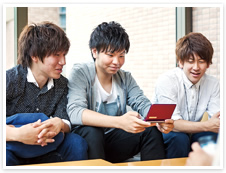 The 2012 academic year was the second year of the second phase midterm plan. In addition to the steady advancement of the midterm plan, we developed a 2012 academic year plan that also incorporates the recovery-support efforts.
The 2012 academic year was the second year of the second phase midterm plan. In addition to the steady advancement of the midterm plan, we developed a 2012 academic year plan that also incorporates the recovery-support efforts.
For the recovery of Iwate Prefecture, we have promoted planning focused on a 6 Priorities Plan. The entire university has been united in carrying out activities in support of reconstruction in order to respond to the expectations of our students and the community as a university that contributes to both core human resources development and the generation of vitality in the region.
(1) Strategic acquisition of new students that have a strong sense of purpose and passion for learning
●Review and clarification of admissions policies
We held five review meetings concerning admissions tests, reviewed each department’s enrolment acceptance policies (admission policies), and made modifications to the curriculum content in response to the restructuring of the Faculty of Social Welfare in the 2014 academic year.
●New collaborations between high schools and the university, and expansion of exchanges with high schools in the prefecture
We used questionnaires to better understand the needs of test-takers and tried to improve efforts to ensure sufficient applicants. We developed Campus Attendant public relations activities and have held several Open Campus events throughout the year. We gave lectures and held explanatory meetings at high schools. We participated in Yumenavi Live and Boko-homon (Alma Mater Visit) Project on a trial basis. We developed new collaborative projects between high schools and the university such as a system of high school visits to our English classes.
●Economic and academic assistance for aspiring students affected by the disaster
We informed affected students about high school visits to Miyako College and the status of the facility after the earthquake. We have continued to cover their bus fare during Open Campus and to provide special entrance examinations for them. We continue to offer reductions or exemptions in entrance fees and tuition fees of affected students.
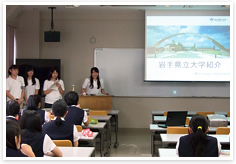 High school visits by “Campus Attendants”
High school visits by “Campus Attendants”
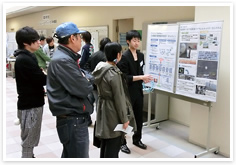 The Open Campus event, held at the same time as the university’s Autumn Festival
The Open Campus event, held at the same time as the university’s Autumn Festival
(2) Execution of a systematic and consistent education program
●Preparations for the opening of the Center for the Planning of Higher Education (provisional name)
Through reviews carried out by the master concept review committee of the Center for the Planning of Higher Education (provisional name), we formulated a master concept for the establishment of an organization that encompasses all cross-university functions such as basic education and university-wide teaching management. We decided to set up this Center for the Advancement of Higher Education in April 2013. By signing new international exchange agreements with three foreign universities, we have expanded to have agreements with 11 institutions.
●Clarification of diploma and curriculum policies
We have formulated adjustments, from the point of view of university-wide midterm goals, etc., regarding each department’s degree conferment policies (diploma policies) and educational course organization and implementation policies (curriculum policies).
●Putting the new academic assessment system into effect and identifying challenges
A university-wide trial was implemented, centered on the introduction of a 5-stage evaluation system and a GPA system. The academic assessment system working group has held six meetings, verified the results of the trial, and reviewed the utilization policies ahead of the full-scale introduction in 2013.
(3) Supporting the development of student employability and promotion of employment within the prefecture
●Enhancement of the IPU-E Map operation system
In the Faculty of Policy Studies, a system of regular self-assessment of employability using IPU-E Map has been implemented. At Morioka Junior College and in the Faculty of Software and Information Science, we have advanced to a trial of IPU-E Map and activities related to career design.
●Development of systemization of career education courses and the structure of career courses.
For the systemization of career education courses, we established career-formation courses in the Faculty of Software and Information Science, the Faculty of Policy Studies and Morioka Junior College from the 2013 academic year. We promoted the employability support project using “Improvement of education and enhancement of system development projects to respond to the needs of industry”, human resources training adopted by MEXT.
●Promotion of networking with prefectural businesses and preparation for the civil service examination
We proactively held forums in each faculty as well as seminars and lectures, briefings, visits to businesses, and so on. We created networks of businesses, etc., in Iwate, and provided information about Iwate businesses to students. In the Faculty of Policy Studies, we promoted various kinds of civil service measures using the Regional Public Human Resources Research Center.
(4) Carrying out research that is valuable to the region and publically disclosing the results
●Promotion of research into local challenges and improvement of the scientific research grant application rate
We promoted research aimed at solving regional problems, utilizing each faculty’s area of expertise and focusing on research related to reconstruction support. We established the “Scientific Research Grant Project Award” and selected three recipients. We conducted a campus briefing for Grants-in-Aid applicants with former judges.
●Proactively releasing the research results of the university to the broader community
We made efforts to inform the people of Iwate as much as possible about research results by improving each faculty’s web page and through extension lectures, academic societies within the university, publication of reports, the Open Campus event, and so on. We issued an interim report on earthquake reconstruction research at the Regional Policy Research Center. We released the results of the i-MOS research topics and the JST project at the university festival, and created and distributed a research results report.
●Promotion of the search for new research themes on earthquake recovery etc.
We make effective use of research funding of the faculties, etc., and emphasize earthquake disaster reconstruction research. We are working on research topics responding to the specialized fields of each faculty.
(5) Strengthening collaborations between industry, academia and government, and making full use of think-tank functionality
●Promotion and support to deal with regional problems such as earthquake disaster reconstruction
A total of 3,882 students from 135 universities nationwide have participated in the volunteer activities of the Iwate GINGA-NET Project, supporting reconstruction after the Great East Japan Earthquake and Tsunami. We have provided support, such as ensuring there is a base for their activities. In addition to adopting and supporting the Faculty of Nursing’s “Kakkiis” group as an IPU-E project, we have leveraged the expertise and human resources of each faculty, and deployed hands-on activities aimed at solving regional problems of the prefecture and activities that contribute to the local community.
●Promotion of research in the Earthquake Disaster Recovery Research Division
At the Regional Policy Research Center, we promoted the Earthquake Disaster Recovery Research Division (15 topics), and promoted new regional cooperative research (Faculty Proposition Type: 9 topics, Local Community Proposition Type: 29 topics).
●Promotion of faculty participation in i-MOS, engineer training, and product development.
We promoted faculty participation for i-MOS and also added external experts to strengthen management systems. We leveraged the Regional Innovation Strategy Support Program, the “Center for the Development of Next Generation Mobility Technology that is Friendly to the Environment and the Local Community” project selected by the Ministry of Education, Culture, Sports, Science and Technology, and promoted joint research between industry and academia centered on the automotive industry. We held workshops for high-level engineers and a variety of study sessions.
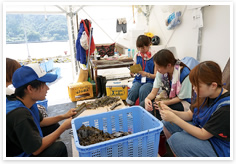 Fishery support in Iwate GINGA-NET
Fishery support in Iwate GINGA-NET
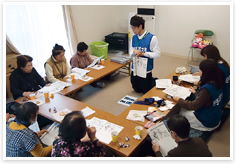 “Kakkii’s” activities in Yamada
“Kakkii’s” activities in Yamada
(6) Development of teaching staff who contribute to the realization of the ideals of the university
●Implementation of university-wide FD (Faculty Development) procedures and program enhancement
As well as expanding trials of reciprocal course auditing among teaching staff to all courses, and the decision to carry out full implementation from the 2013 academic year, we improved course evaluations by students. Each faculty implemented distinctive FD projects.
●Review of the human resources development plan and promotion of skill development of staff
We reviewed the human resources development plan of the “cross-functional team for human resource development of staff”. We implemented the new “improving staff ability GP project”. (*GP = Good Practice)
●Establishment and proper management of a teaching staff evaluation system
We established a teaching staff performance evaluation committee based on the teaching staff performance evaluation guidelines and initiated a full-scale implementation of the system. We reviewed the operational challenges and added some evaluation categories.



